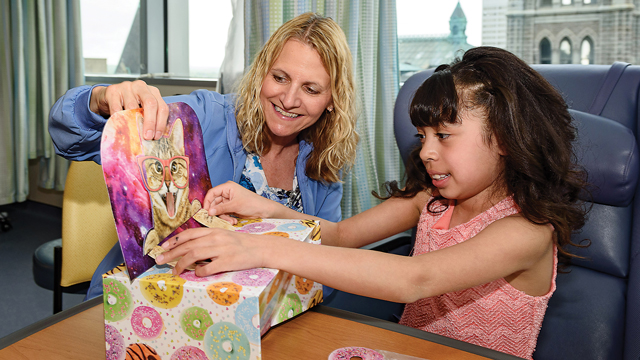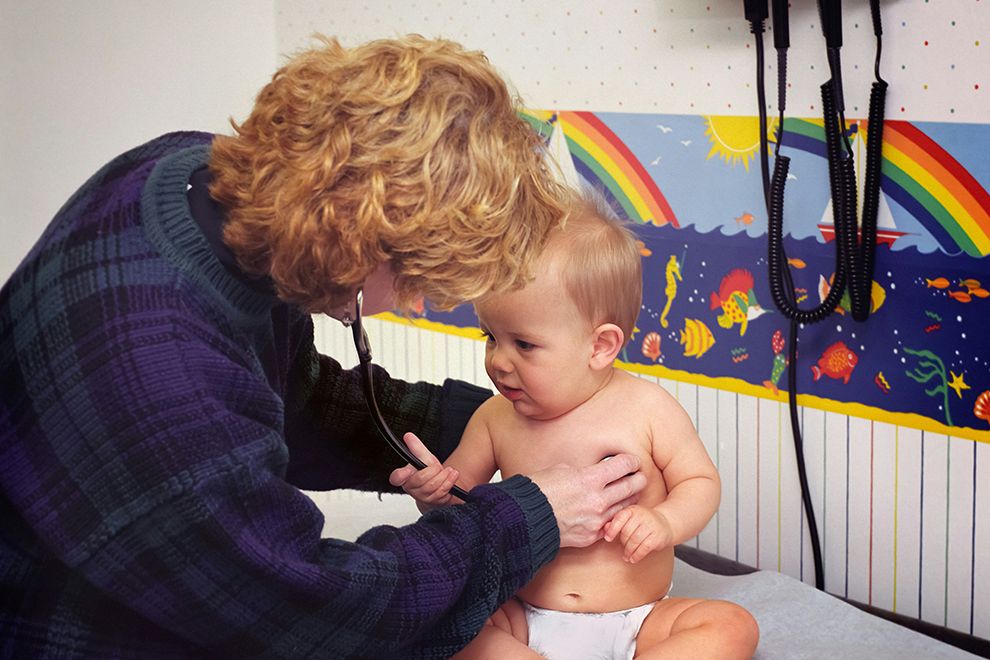A little preparation and extra comfort go a long way for a child facing surgery. From the weeks leading up to surgery to the no-food directive the night before and a special send-off when you leave your child’s side, there are ways you can support her and ease the stress and worry that can go with the experience.
When It’s Weeks Away
Ask questions. Ask as many questions of your child’s doctor as you need so you feel prepared for what to expect and you can answer questions your child may have. Write down what the doctor or nurse says and refer to it when answering your child’s questions. It helps to have a second caregiver present when discussing the surgery for extra support and to help remember what
was discussed.
Be honest and encourage your child to ask questions. If you don’t know the answer to a question, it’s okay to say, “I don’t know.” However, let your child know that you’ll ask the doctor or nurse or find out the answer together. (Note: I don’t recommend Googling answers to questions about surgery; instead check in with a member of your child’s care team.)
Be patient and available, offering extra cuddles, compliments, and reassurance. Having surgery is stressful, no matter how easy a surgery may appear, and the time leading up to it can be stressful, too. Young children may be extra fussy or difficult to console; older children may be grouchy or frustrated. It’s also just as important to take care of yourself so you can be there to be supportive when your child needs it most.
Plan ahead. Make arrangements for siblings to be taken care of by other caregivers the day of the procedure, and arrange for pickup from school and aftercare if needed.
In the Days Before
Talk about what will happen. Depending on your child’s personality, he may benefit from spending time with you talking about the surgery. You might review some of the specifics of what will happen that day – what to expect at check-in, for example, and how there will be a lot of people in scrubs asking a lot of the same questions.
Use special language and role play if applicable. When you talk about it, reinforce that the surgery is not a punishment, but a way to fix something that needs to be fixed. Or in the case of something being removed, that the doctors are taking away something that’s broken or not working anymore.
If you think your child will be nervous about the anesthesia mask, ask for one to practice with. Have your child put the mask on a favorite doll or stuffed animal or on you so she can get used to how it looks, feels, and smells. Then hold the mask gently over her nose and mouth and have her sing a song or count and practice taking deep breaths while wearing the mask.
Encourage your child’s participation in getting ready. Let him pick out an outfit to wear to the hospital and pack a bag of his favorite toys and games. Encourage him to bring along something he finds comforting or something that reminds him of home (favorite blanket, books to read at night, photos of family). It can be a good idea to pack these items even for an outpatient procedure. Often, a child may not be able to eat or leave the room before surgery and having something familiar or entertaining can help pass the time when waiting. (On a side note: Bringing extra underwear/diapers is always a good idea in case of accidents or mishaps.)
Don’t forget to pack a bag for yourself. Include items for your personal needs and any medications you take regularly. Even if you’re just there for the day, having what you need to keep yourself comfortable can help you better focus on your child. And if your child’s stay ends up being longer than expected, it’s good to be prepared. If siblings are coming with you, pack activities and snacks for them.
Ask friends for help or a favor. When friends and family ask how they can help, ask them to write cards your child can read while waiting on the day of surgery or as she recovers in the hospital. Bringing these with you for your child to open can help her feel loved and supported at a stressful time. It can be a nice way to pass the time and can make such a difference.
The Night Before
Follow the NPO order carefully. It’s common for a child to be instructed not to have anything to eat or drink (including chewing gum) after a certain time the night before surgery. The term you might hear is that your child will need to be NPO, a Latin phrase – nil per os – that translates literally to “nothing through the mouth.” If you’ve received these instructions, it’s very important that you not allow your child to eat or drink after the set time, or the surgery will have to be delayed or cancelled for your child’s safety. Be sure to check for specifics. Instructions may differ depending on the type of surgery and a child’s age. It’s also important to find out ahead of time if this applies to any medications your child normally takes in the morning.
Plan a meal for everyone to eat the night before. If this works for your family, you might also consider allowing the child who’s having surgery to choose one of his favorite foods or to pick a favorite restaurant. This makes the night before surgery a happy memory for the child and it instills a sense of pride to see the family supporting and celebrating him before a big day.
Consider adjusting bedtime. Many families will allow their child to stay up later than usual or wake the child to have a late-night snack or meal prior to being NPO. This can help the child sleep longer in the morning and/or encourage napping before surgery – and the shorter the fasting time, the less stressful it will be overall.
Pass the time together. To help your child through the time she is unable to eat, work on a puzzle, read books, or watch a movie. Decorating her hospital room can be a nice way to pass the time if your child is staying in the hospital. And remember, whether you’re at home or in the hospital with your child, sleep is always a good idea.
The Day of Surgery
Remind your child about the important details. Walk her through what’s going to happen in simple steps: “First, we’ll check in. Then you’ll get in your gown. We’ll play or read until the doctors come, then I’ll kiss you on the cheek three times, and the nurses will take you to the room for surgery. They’ll put a mask on your face with special medicine to help you fall asleep. When you wake up, I’ll be here and you’ll be done.” When you make your child familiar with what to expect, you can reduce anxiety and increase her willingness to cooperate.
Play a soundtrack. During the drive to the hospital or surgery center, play favorite songs to boost morale. You can let your child pick a soundtrack or power song ahead of time for this and download it on a phone or tablet so it’s ready to go when needed.
Use a code. Have a special sign or saying that you can share with your child before he goes into surgery. A special handshake, a message like “See you soon,” or simply blowing kisses can provide comfort, familiarity, and a timely distraction. You might come up with what you’d like this to be together.
Keep it together. Above all, be brave, positive, and encouraging when you’re with your child on the day of surgery. Too often, we see parents who are scared themselves and start to cry, and it can be difficult for a child going into surgery to see this as the last memory of a parent.
You’ll have many opportunities along the way to affirm your child’s feelings and offer her emotional support in the weeks and moments leading up to surgery. Surgery is scary, no matter how old you are. Let your child know that it’s okay to be nervous. And always remind her there’s a whole team of specialists dedicated to keeping her safe and seeing her through surgery.
photo: Doug Buerlein





